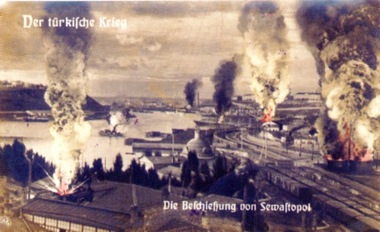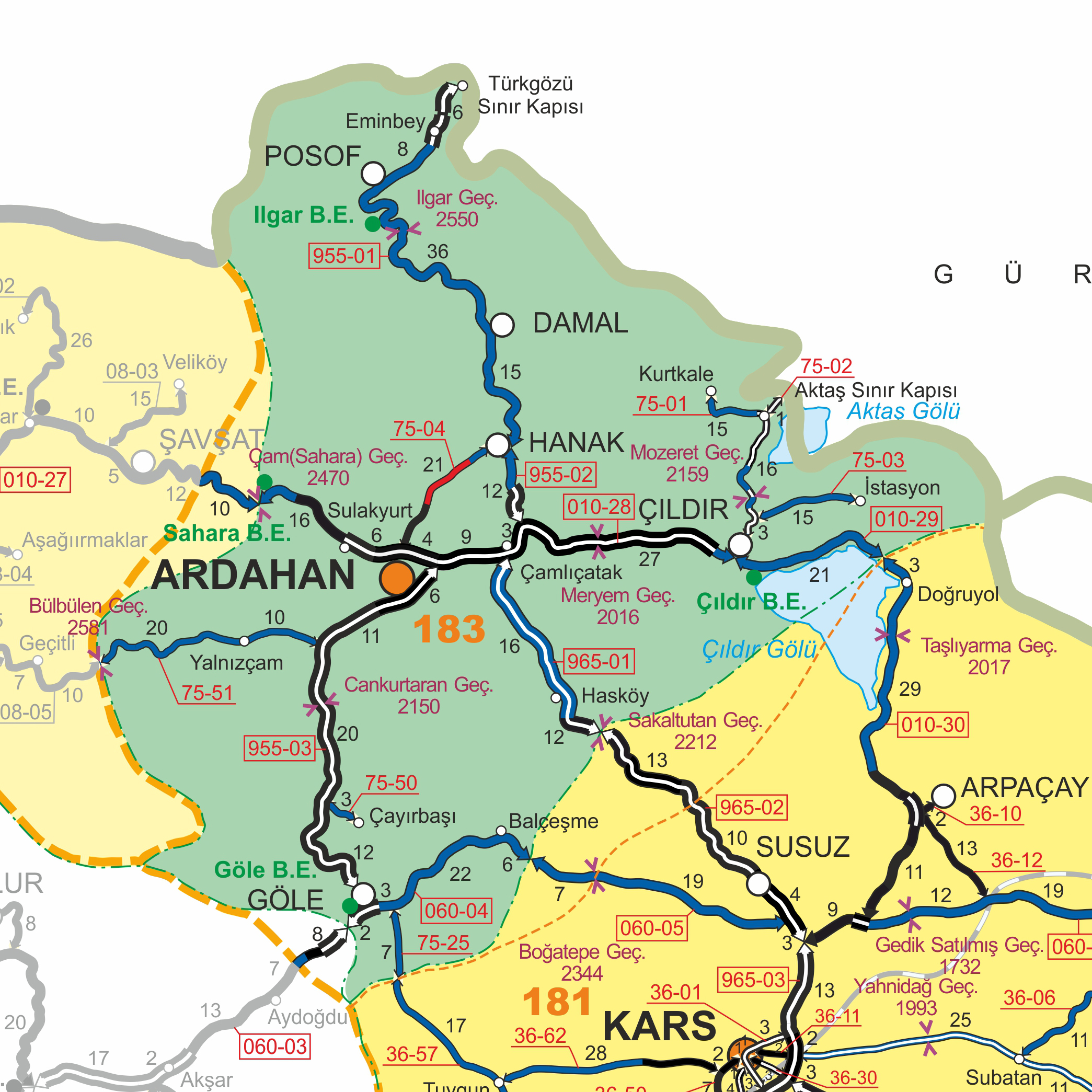Iranian observer sets the scene in northeastern Anatolia
and takes note of some early Turkish-Russian
skirmishes.//
Precursors to the Operations
Black Sea/War Entry see this TNT report about one of the
Ottoman Navy ships involved in the Black Sea incident
that prompted Russia to declare war on Turkey in the
Fall of 1914.

Ottoman Navy bombardment of Sevastopol on 29 October
1914.
On 7 – Akreb – 293 (1) (17 October 330), as the result of clashes
between the Russian and Turkish fleets in the Black Sea, Russia
declared war on Turkey and the assembly of the main forces of each
side was just about completed. At the same time, the Russians were
well on their way to ensuring transport and movement via the Tblisi-
Sarıkamış rail line and the Sarıkamış – Kara Urgan highway, running
along the rail line. The Russians were also well-positioned near to the
border.
(1) I was not completely able to research the conversion
of the days.
If the main Turkish force wanted to launch a pre-emptive attack it would
have to traverse another thirty-five kilometers in order to reach these
points.
The Russians’ main pressure was evident on the road between Kars and
Erzurum. Between 9 and 13 Akreb (19-23 October) Turkish border posts
were withdrawn and the Russians occupied Zivin, Erdest, Arap,
Köprüköy and the Erzurum-Beyazid road. And the Russians sent a light
force from the northern flanks at Kağızman to Karakilise via the Işıkdağ
Pass road, with another force moving from Serdarabad across the border
through the Bulakdağ and Mt. Pambuh passes to Beyazid and Diyadin,
which they occupied without resistance.

In view of this situation and position, the Russians had accomplished
the first part of their plans, with the following results:
1 – the Russians had effectively forestalled the Turkish attack and the
Turks had been repelled much further away from the border than they
had anticipated they would be. The consequence was that the Russians,
who needed time, were in a position to move support forces in before
the battle was decided.
2 – The seizure and occupation of the upper portion of the Murad valley
deprived the Turks of any chance of an attack on Yerevan via Serdarabad
or on Nahcıvan via Mako and any help from the Cengcu Celali tribes
around Mt. Ararat.
On the fifteenth of Akreb (25 October) the Ninth Turkish Army Corps
stopped the advancing Russians five kilometers east of Hasankale and
drove them toward Köprüköy, where their main force was located.
A support division sent from the Tenth Army Corps reached Köprüköy
and, along with a few Kurdish cavalry companies, advanced in the
direction of Kağızman and pursued the Russians to the border. On 19
Akreb (29 October) Köprüköy was seized. A detachment from the First
Turkish Army passed the border at Makrıyalı ((today's Kemalpaşa)) on
the Atina (Pazar) – Batumi road, attacked the port position and after a
four-day battle, in which a cruiser participated, took the aforementioned
port position on 29 Akreb (7 November).
the Atina (Pazar) – Batumi road, attacked the port position and after a
four-day battle, in which a cruiser participated, took the aforementioned
port position on 29 Akreb (7 November).
In the coastal mountains, another detachment of the First Army that came
from Mt. Makara and Dere Murgul Su cut off the Russians’ line of
retreat at Artvin and forced them to retreat further to mountains south
of Çürüksu. And Artvin was occupied by detachments of the same
army corps that had come from Çürük and Okum.
of Çürüksu. And Artvin was occupied by detachments of the same
army corps that had come from Çürük and Okum.
27 Akreb (6 November)


A portion of these forces marched to Otishane in order to advance
toward Batumi via the Çürüksu valley, while another portion made up
of a division headed for Ardanuç. There was a clash in the Id
valley to the south of the Oltu valley. The Russians were trying to a
move toward Hasankale and to threaten the main force of the Third
Army, which had secured the northern flank with a division.
toward Batumi via the Çürüksu valley, while another portion made up
of a division headed for Ardanuç. There was a clash in the Id
valley to the south of the Oltu valley. The Russians were trying to a
move toward Hasankale and to threaten the main force of the Third
Army, which had secured the northern flank with a division.
After a brief stop at Köprüköy, the Third Army extended its forward
operation as far as Azap. Troops from the reserve Eleventh Army
Corps were moved here in light of the arrival of new forces from Kars
for the Russians. A paucity of ammunition caused new stops because
the mules were only able to traverse short distances en route to the
battlefield.
operation as far as Azap. Troops from the reserve Eleventh Army
Corps were moved here in light of the arrival of new forces from Kars
for the Russians. A paucity of ammunition caused new stops because
the mules were only able to traverse short distances en route to the
battlefield.
Cossacks coming from Kağızman confronted Turkish support forces at
Bozviren. The Russians seized the Beyazid – Zedikan road in the
Murad River valley and wanted to head toward Malazgirt. They stopped
at the Tutak border and seized Tutak on 25 Akreb (4 November). Even
so, the Kurdish tribes regained it from the Russians and forced them
to retreat, first to Hamur and then to Karakilise. 29 Akreb (7 November).
Bozviren. The Russians seized the Beyazid – Zedikan road in the
Murad River valley and wanted to head toward Malazgirt. They stopped
at the Tutak border and seized Tutak on 25 Akreb (4 November). Even
so, the Kurdish tribes regained it from the Russians and forced them
to retreat, first to Hamur and then to Karakilise. 29 Akreb (7 November).
Consequently, on 3 Kavis (13 November) the Turks’ plans were
completely understood. As the main force of the Third Army prepared
for an attack on Kars, it was necessary for the Çürük arm, which would
have to complete the operation to surround the Russians, to advance
quite far along the Ardahan road and seize three passes. And although
they showed ardor initially, snow and winter weather closed the
mountains and obstructed their movement.
completely understood. As the main force of the Third Army prepared
for an attack on Kars, it was necessary for the Çürük arm, which would
have to complete the operation to surround the Russians, to advance
quite far along the Ardahan road and seize three passes. And although
they showed ardor initially, snow and winter weather closed the
mountains and obstructed their movement.
Even though the Turks, by neglecting the importance of the possible
Russian threat to their right flanks and the Russians’ seizure of the
Eleşkirt and Beyazid valleys, did not prevent these moves, they
stopped at the crestline of the mountains south of these valleys. The
Turks envisioned chasing the Russians away from their positions here,
after re-supplying along the Kars-Erzurum road, their essential position.
Russian threat to their right flanks and the Russians’ seizure of the
Eleşkirt and Beyazid valleys, did not prevent these moves, they
stopped at the crestline of the mountains south of these valleys. The
Turks envisioned chasing the Russians away from their positions here,
after re-supplying along the Kars-Erzurum road, their essential position.
This Russian presence, though, upset the Turks’ assembly at Hasankale
and the Russians resistance at Köprüköy and Azap delayed the Turkish
attack. Within this time frame, the Turks were successful in clashes that
occurred between Kotur and Beradost, crossed the border at Oşnu and
incited the Kurdish tribes in Iranian territory.

//End of Part III//
and the Russians resistance at Köprüköy and Azap delayed the Turkish
attack. Within this time frame, the Turks were successful in clashes that
occurred between Kotur and Beradost, crossed the border at Oşnu and
incited the Kurdish tribes in Iranian territory.

//End of Part III//

Hiç yorum yok:
Yorum Gönder